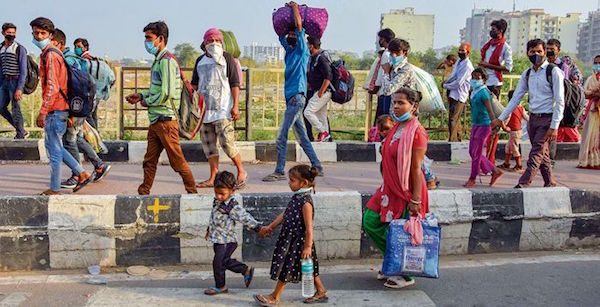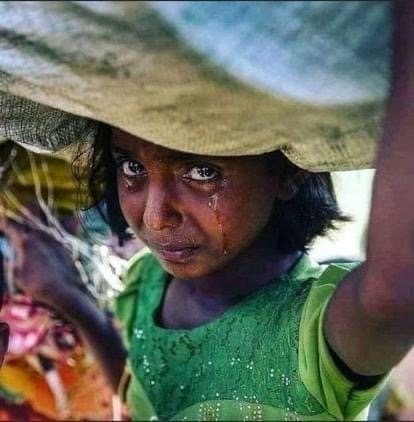

|
“Since the beginning of the nationwide lockdown due to the Covid-19 pandemic, India and the world have seen on TV channels disturbing pictures of thousands of migrant workers — including women and children — walking on foot or some other means of transport, to reach their home states hundreds of miles away from the places where they have been working for a livelihood. We have also seen the images of protests by those wanting to go home at railway stations at many places.” |
More technocrats should head senior positions. By chance, we do have a doctor as the Health Minister but the officials working in the ministries and at the cutting-edge level are not medicos. It’s important to have technocrats in such positions because today it is a health problem, tomorrow it can be a problem in space or cyber fields.
Since the beginning of the nationwide lockdown due to the Covid-19 pandemic, India and the world have seen on TV channels disturbing pictures of thousands of migrant workers — including women and children — walking on foot or some other means of transport, to reach their home states hundreds of miles away from the places where they have been working for a livelihood. We have also seen the images of protests by those wanting to go home at railway stations at many places.
Such images continue even today. Heart-wrenching stories of their misfortune in not getting shelter or food and being stopped every now and then with some brutality at times at the hands of the police disappoint a lot. Some of them have lost their lives in accidents. Though trains and earlier buses have been used to ferry them, their number is too big. Besides, many of them don’t have money to buy tickets though most of the bill is being footed by the government. This has sullied the image of India even though they had been advised by the government against moving like this, and shelter and food is being provided to most of them by the state and Central governments, and by NGOs, corporates and well-meaning individuals.
The Prime Minister announced a sum of Rs one thousand crore from the PM Cares Fund for these migrants recently. And the Union Finance Minister has announced free distribution of ration to them for two months; more work under MGNREGA once they are back to their villages etc. But basically, their demand now is psychological — to reach home come what may. But this problem has also given a lot of ammunition to the Opposition, who are criticizing the Centre for not looking after these people. This has also given a cause to many activists who have been approaching the Supreme Court, trying to get directions to the Central government to look after these migrant workers, financially and otherwise, helping them in reaching home, while accusing it of being insensitive to the needs of the poor folk.
In the process, the rosy picture of India emerging as a superpower has taken a beating. It won’t be fair to lay the entire blame on the doorsteps of the Central government and its leadership for this situation. After all, it was a sudden calamity, not only for India but the whole world. Many powerful countries with less population and rich economy and much better healthcare systems have fallen by the wayside. The government had to respond quickly and rightly leading to a lockdown which has caused this hardship to millions of migrant workers.
The way forward should be to ease their pain as much as possible and learn lessons so that we’re better prepared in the future when such situations arise. The two examples of sudden demonetization and lockdown leading to hardships are sufficient for us to learn lessons and plan a roadmap. Some of the suggested steps are as follows:
First, there should be no sudden announcements as far as possible. Of course, in a war-like situation, such sudden action can’t be ruled out.
Secondly, there should be careful planning to ensure that the poor don’t suffer from hardships. The Central and state governments should prepare contingency plans based on past experience in India and abroad, and about an unlikely situation like the coronavirus. It should include possible situations in areas like defense, warfare of different kinds including those in space and cyber fields, internal security, medical situations, severe natural disasters and many more. Such a planning will help. I recall today with satisfaction that as the Director General, Civil Defence, Government of India, I had formulated the proposal of raising the NDRF in 2003, considering the necessity which fructified and now we have this force doing a great service.
Thirdly, for putting every plan in action, there should be SOPs and rehearsals as per these like it is done in disaster management situations or war exercises.

Fourthly, where a large-scale movement of the working class is inevitable, plans should be prepared to keep the movement to the minimum and take care of their comfort. The lessons learnt during the current Covid crisis will be a good foundation to work on these plans.
Fifthly, there should be heavy investment in education and healthcare. Had it been done earlier, migrant workers would have behaved differently, and we wouldn’t have been struggling to put up a healthcare system to match the current need. Luckily, we haven’t failed because the problem is not that big in India so far.
Sixthly, and very importantly, the bureaucracy has to be more nimble-footed. As per the general perception, it hasn’t covered itself with glory during this recent tragedy. For these, large-scale changes are required, from recruitment to training and attitude etc. The PM must give a push to this like Margaret Thatcher, the then British PM, had done during her tenure in the UK. It is also suggested that senior bureaucrats should be hired or employed for a ten-year period and their tenure getting extended for the next ten years should depend on their performance during the first term. In all, there should be two extensions, i.e. they shouldn’t serve for more than 30 years. It should apply to all services.
Seventhly, more technocrats should head senior positions like secretaries and joint secretaries. In the recent case, we do have a doctor by chance as the Union Health Minister but the officials working in the ministries and at the cutting-edge level are not medicos. It’s important that we have technocrats in such positions because today it is a health problem, tomorrow it can be a problem in the space or cyber field. So, those knowledgeable in such areas will do a much better job.
Next, the wages and other facilities or service conditions of the technocrats and others like the police should be at par with the top civil service to acknowledge their contribution. Today, even though the technocrats are more qualified, they serve under non-technical persons and have a lower position in society.
Also, departments like the police, health, space and others should be reporting directly to the ministers rather than through the senior bureaucracy.
Lastly, political parties need to be more sensitive to the needs of the country and society. Politicking should be avoided. The good of the nation and showing unity to the world in adversity should be the aim of parties. It doesn’t mean that they shouldn’t find fault with each other for the wrongs that are being done in their assessment, but the tools used to criticize should be decent. They shouldn’t oppose always for the sake of opposing.
India is great and so are Indians. Nobody can stop our march to being a super-power in the current century, but for that, a lot of hard work is required, and specially to acquire competency in dealing with sudden situations for which we should be well prepared.
(The author is a former DGP, Tripura)





Be the first to comment